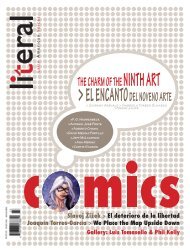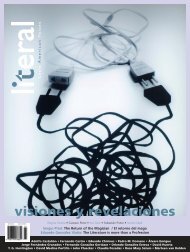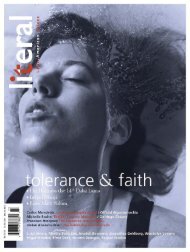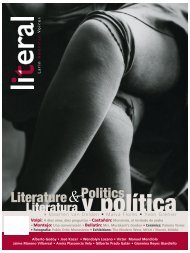Primo Jim Tanya Huntington Hyde - Literal
Primo Jim Tanya Huntington Hyde - Literal
Primo Jim Tanya Huntington Hyde - Literal
You also want an ePaper? Increase the reach of your titles
YUMPU automatically turns print PDFs into web optimized ePapers that Google loves.
ley, is leading the way using neuroscience, to show how<br />
word pictures are formed that report enlightenment and<br />
enjoyment from the brain to the mind. It is our nature<br />
as sentient beings.<br />
It basically comes to this. Words, just like images, can<br />
evoke strong reactions and responses. This is the same<br />
dopamine pathway in the brain operating as it does with<br />
a fi ne coc au vin, a chocolate truffl e, a nice Burgundy and<br />
making love. We are not—cannot be—easily disembodied<br />
from our words. We are by nature sensate.<br />
Lakoff argues we become disembodied when the<br />
mind—or is it the brain—fails to associate freely and is<br />
instead harnessed into logic and syllogisms and structures<br />
where the neural inspiration leaves the thought.<br />
In other words, there is no giant equation or logic out<br />
there that will explain the world. Logic and math are<br />
just languages for translating nature. Some day, the<br />
ah-ha moment of enlightenment and understanding<br />
might get captured in a brain scan like an x-ray of philosophy.<br />
Lakoff explained to me that about 98% of thought<br />
is not conscious. That’s why facts, unless they have<br />
“frames” around them, don’t matter. These are the<br />
worldviews going into the words we use. Our morality<br />
and politics come from what our brains are doing below<br />
the conscious level.<br />
36 4 LITERAL. LATIN AMERICAN VOICES FALL, 2008<br />
Furthermore, everyone has mirror neurons that<br />
fi re up when you do something or see someone doing<br />
something, he explains. That’s why we can have feelings<br />
of fear, anger and happiness when we see it in others. It<br />
is how we empathize. Those neurons fi re up more when<br />
we cooperate, he adds. We are biologically wired for<br />
cooperation.<br />
Now here’s the astounding part. Lakoff says empathy<br />
has to be developed and used or the brain will atrophy.<br />
And that brave new world insight is the strongest<br />
case for the arts, creativity and the worldviews coming<br />
from writers’ words.<br />
Brain science is telling us what we did not know<br />
about dialog, that it sparks dopamine and it gives readers<br />
a strange comfort and solidarity with the writer.<br />
If anyone thinks brain science portends the end of<br />
literature as a way to understand humans, think again.<br />
Think what Persaline, Scarlett Johansen’s character, said<br />
in the movie A Love Song for Bobby Long: “Everybody<br />
knows books are better than life. That’s why there’re<br />
books.”<br />
Jos é de la Isla is a nationally syndicated newspaper columnist and author<br />
of The Rise of Hispanic Political Power (2003) and the forthcoming<br />
Day Night Life Death Hope (2008).






